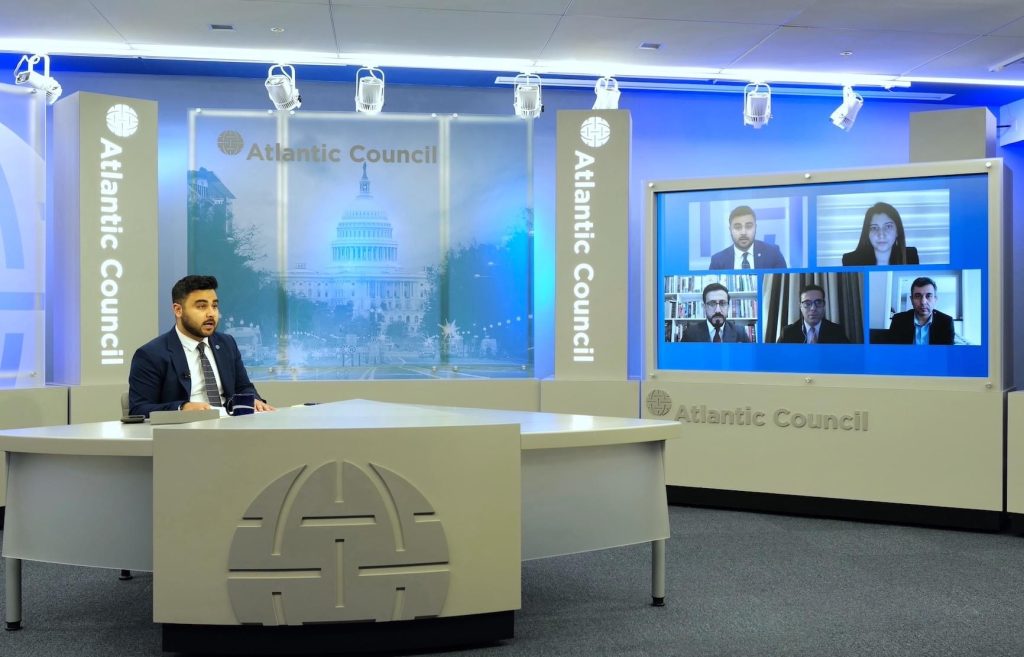Opening remarks:
On March 20, to reflect on the twenty-year anniversary of the U.S. invasion of Iraq, the Atlantic Council’s Iraq Initiative held a discussion to amplify the voices of Iraqi youth. “Trajectories of Iraqi youth two decades after the 2003 invasion: Between aspirations and reality” featured introductory remarks from the Director of the Iraq Initiative, Abbas Kadhim, and was moderated by Hezha Barzani, a Program Assistant for the empowerME Initiative at the Atlantic Council.
In his introductory speech, Abbas Kadhim stressed the importance of including youth in the debate about the future of Iraq, arguing that “youth are not only entitled to be present, but are called to lead the debate, as they will be the most affected by it”. This was further emphasized in Hezha Barzani’s introduction, where he noted that 60 percent of Iraq’s current population is under the age of twenty-five.
The panel featured empowerME Program Assistant Nibras Basitkey, who highlighted the importance of being solution-oriented when discussing the future of Iraqi youth. It also featured a researcher at the Stockholm International Peace Research Institute, Shival Fazil, who claimed that Iraqi youth “do not feel represented by the current system of government in Iraq and are stretching across ethnic and religious identities in favor of an issue-based coalition, seeking political reform”. Adjunct fellow Hamzeh Hadad from the Center for New American Security noted that the years following the invasion “were tumultuous, with Iraqis facing global issues” such as the expansion of the Islamic State of Iraq and al-Sham (ISIS) and the global pandemic. This point was built upon by co-Founder and President of Sinjar Academy, Murad Ismael, who claimed that “youth in post-ISIS Iraq are rejecting extremism”.
Problems currently facing Iraqi youth
A consensus was reached among the participating panelists that the present nature of the Iraqi youth is characterized by their collective desire for reform and coalition-building. The emerging trend of national movements are transcending ethnic, religious, and cultural lines. Hamzeh Hadad explained this phenomenon as being “a product of Iraqi unity against ISIS as well as the younger generation’s exposure to sectarian violence in the aftermath of Saddam Hussein’s rule”. He also explained the unification of Iraqi youth with the failure of the Iraqi leadership class, which resulted in a widespread protest movement. Another problem currently affecting Iraq is the persistence of internal displacement accompanied both the 2003 invasion and the ISIS insurgency. The second wave of displacement that took after 2024 in Iraq has particularly impacted minority communities. Basitkey, Ismael, and Fizal all pointed to the plight of the Yazidi population which had been persecuted by ISIS and remains scattered with negligible access to basic civilian infrastructures and education.
When discussing the current threat of ISIS resurgence, Shival Fazil claimed, “it is this growing disillusionment with politics and resentment toward the ruling elite that runs the risk of being exploited and weaponized by the Islamic State or other extremist groups.”
This statement demonstrates the importance of addressing the concerns of the Iraqi youth and committing to political, economic, and social reform for both humanitarian and security reasons. Youth are also facing the repercussions of climate change, which will continue to be a serious threat to the country, both on livelihoods and security fronts. Hamzeh Hadad pointed to the inadequate preparedness of the country to combat climate change, arguing that “both Iraq and the international community must team up to create the appropriate infrastructures to cope with modern problems such as climate change.”
Importance of education
One of the most pressing problems currently facing Iraqi youth is limited access and poor quality education. Each of the panelists spoke to this importance extensively. Nibras Basitkey claimed that “this phenomenon was worsened by the onset of the COVID-19 pandemic and has disproportionately impacted minorities”. Additionally, Iraqi youth experience a significant setback in their education due to limited access to technology during the pandemic. Murad Ismael highlighted the importance of technology in improving education, claiming that “technological training in Iraq is extremely outdated and individuals who pursue higher education in technology in Iraq finish their degree with a high-school level understanding”. He offered that smartphones could be harnessed to improve education, but “there must be a campaign that compels individuals to maximize the educational value of their phones”. Basitkey further argued that “Iraq requires an updated curriculum that would focus on technology and skills that would optimize youth’s chances of obtaining jobs in the local market”. Additionally, “women’s access to education must be significantly improved”.
The value of economic growth
Iraq’s economy is highly dependent on oil and most jobs lie in the public sector-this is problematic for numerous reasons. Murad Ismael argued that “a prosperous private sector is essential to a functioning democracy in Iraq”, as the public cannot voice their political opinions freely if they are dependent on a particular political party for employment. Furthermore, oil prices are extremely unstable. Shivan Fazil highlighted the consequences of an oil-dependent economy and advocated for “the establishment of a competitive and reliable private sector”. Economic development is also a social issue. Basitkey argued for “the necessary inclusion of women in the Iraqi economy by challenging social norms and initiating campaigns that encourage women to participate in politics”. This will improve economic growth and mobilize a highly underutilized sector of the population.
Each of these issues requires a tremendous commitment not only from Iraq but also from the international community. To ensure the success of Iraq’s bright youth population, these issues must be addressed, specifically, those of economic and educational concerns, concluded the panelists.
Britt Gronemeyer is a Young Global Professional with the Middle East Programs at the Atlantic Council.
Image: Captured by Phil Pasquini
